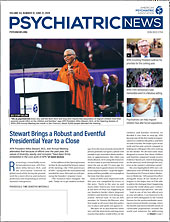“Decisional capacity” in the context of a patient requesting physician-assisted death (PAD) is a more complex and nuanced determination than the standard assessment made by consultation-liaison psychiatrists when assessing patients’ capacity to assent to or deny standard medical treatment.
So said John Peteet, M.D., a psychiatrist in the Psycho-Oncology and Palliative Care Department of the Dana-Farber Cancer Institute at the session “Physician Aid in Dying: A Closer Look at the Psychiatrist’s Role” at APA’s 2019 Annual Meeting last month in San Francisco.
PAD is legal in several jurisdictions. As a result, psychiatrists in these areas are increasingly being asked to assess the decisional capacity of individuals requesting PAD. Traditionally, psychiatrists use the four “Appelbaum-Grisso” criteria to determine a patient’s capacity to consent to treatment, which include the abilities to communicate a choice, understand the relevant information, appreciate the situation and its consequences, and reason rationally.
Those criteria were published in 1989 in The New England Journal of Medicine by past APA President Paul Appelbaum, M.D., and Thomas Grisso, Ph.D., a professor of psychiatry and director of the psychiatry and law program at the University of Massachusetts Medical School. Appelbaum is a member of APA’s Committee on Judicial Action and the Elizabeth K. Dollard Professor of Psychiatry, Medicine and Law at Columbia University.
But Peteet and others at the session argued that in the context of PAD—when a life-ending decision hangs in the balance—assessment of a patient for “capacity” requires the psychiatrist to go beyond checking off the four criteria to actively working to help expand the patient’s capacity for envisioning other options.
For one thing, Peteet said, research has shown that psychiatrists’ beliefs about how the Appelbaum-Grisso criteria should be applied in cases of PAD correlated most directly with whether the psychiatrist believed that PAD should be allowed. Of psychiatrists who believed PAD is never ethical, 68% stated that patients with dysthymic disorder were automatically incompetent, compared with 21% of psychiatrists who believed PAD is ethical in some or all cases, Peteet said.
Moreover, quadriplegic patients in the immediate aftermath of a spinal cord injury often express a wish for death, whereas one year later they are likely to report a high quality of life, he said. “Perhaps in the context of PAD where a physician is deciding whether it is appropriate to offer a lethal intervention, a broader conception of what is important and allowable is needed, such as a ‘decision-optimizing’ relationship with the patient,” Peteet said. “What is at stake is not only the patient’s cognitive capacity and DSM diagnosis, but [also] the professional and clinical responsibility of the doctor to the patient.
“Even if a physician agrees that PAD is ethically permissible, he will want to see that the patient is making a fully autonomous decision before acceding to his request,” he continued. “Emotional as well as cognitive elements are important to full capacity in the context of PAD as well as in decisions to withhold or withdraw life-supporting treatments. These may be implied in the ‘appreciation’ criterion of the four-part Appelbaum-Grisso standard, but to be operational needs to be better defined and recognized by those performing capacity assessments.”
Peteet was joined by Rebecca Brendel, M.D., J.D., a member of the APA Committee on Ethics and director of the master’s degree program at the Harvard Medical School Center for Bioethics. She described the legal history behind PAD and research on factors related to patients who seek PAD. Marie Nicolini, M.D., M.Sc., a postdoctoral fellow in the Department of Bioethics at the National Institutes of Health, described the use of PAD in Belgium, where the practice has been extended beyond terminal conditions to also include mental illness; and Sonu Gaind, M.D., an associate professor of psychiatry at the University of Toronto, described the situation in Canada, where the extension of PAD to nonterminal conditions is being debated. ■
“Assessing Patients’ Capacities to Consent to Treatment” by Appelbaum and Grisso can be accessed
here. “Evaluation of Competence to Consent to Assisted Suicide: Views of Forensic Psychiatrists” is available
here.

